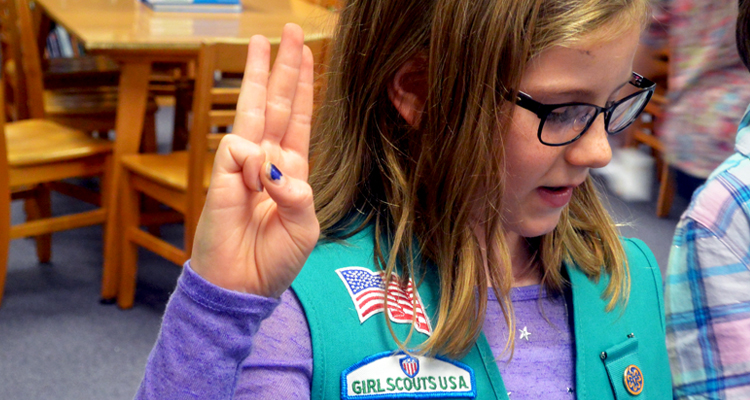When I arrived at the meeting, the Girl Scout troop leader took me aside. “I have to tell you, my daughter doesn’t like writing at all,” she admitted. “I’m hoping having you here will inspire her.”
I had my own admission, too. I’ve never known much about the details of Girl Scouts beyond selling cookies and wearing green. But, as it turns out, the Girl Scout organization makes an effort to tie writing and leadership together for their young members. And this is how I, a 43-year-old writer, ended up at my first-ever Girl Scout meeting at a school library in Leesburg, Virginia.
A parent volunteer invited me to talk to Girl Scout troop #6752 as part of their ongoing theme of demonstrating women as leaders as well as efforts to encourage each girl to earn the “Scribe” badge. A description of why the Scribe badge is important states, “Words are powerful tools. Great writing can make people feel encouraged, entertained, or excited. It can create fantasy worlds or preserve events from history. And just writing down your feelings actually makes you feel better!”
Girls are encouraged to write a poem or short story. But parent volunteer Susana Shingledecker said the troop saw an opportunity to do more.
“All parents agreed that, no matter what meeting we lead, it would be interesting if we could bring in guests to talk to the girls about their jobs,” she wrote to me. “If the girls have done their homework, they should be ready to interview you about your career.”
Certainly, it made sense for an organization that strives to instill confidence in girls to impress upon them how employment is in fact linked strongly to leadership and financial independence for women.
At the meeting, the questions flowed freely, from “What do you write about?” to “What’s the most important part of your job?”
And the one who didn’t like writing? I didn’t count, but she may have asked me the most questions. And with each answer, she seemed a bit more intrigued by and open to the idea of writing. Hopefully, I lifted what may have simply been a veil of sorts that made writing a mysterious thing that evoked a bit of fear about the unknown.
What I told the girls was similar to what I’ve told many other junior writers or students whom I’ve had the opportunity to mentor or coach. Here’s the gist of the tips I offered and that I encourage parents to use with their own children who they want to encourage when it comes to writing:
- Research is a crucial aspect of good writing. If you’re having trouble finding the words, do a little more research, or seek out some more inspiration. For example, if you want to write about trees, take a trip to the nursery to learn about them or go on a hike and observe everything about them: leaves, branches, bark, etc.
- You do not have to be a good writer to write. You can improve with practice, but you have to start somewhere.
- Don’t be afraid to get started. Don’t think too much about it. Just start writing. You can always go back and edit yourself.
- Choosing a topic that a child cares about or loves can serve as big inspiration. Animals? Gaming? Nature? Perhaps your child loves math, science or history. Choosing one of these as a topic can be a good motivator.
- Read. And then read some more. Reading inspires writing and gives young learners examples by which to draw from and be inspired by.
- Look for fun writing activities or exercises, such as keeping a journal during a trip, starting a family blog, or using writing prompts.
By the time I left the meeting, the room was quiet and the carpet was strewn with paper, pens, and little girls busy writing poems or short stories. Sometimes, all any of us needs is to have a little inspiration and encouragement. And that’s something a parent can do for their child every day.


























































